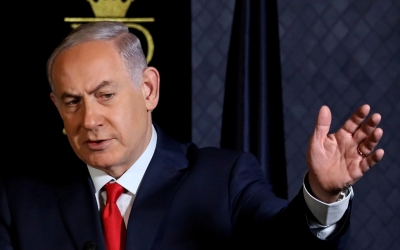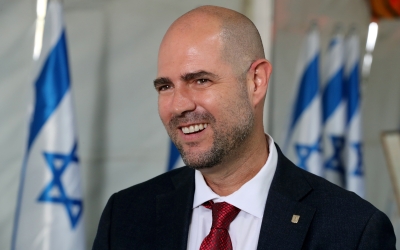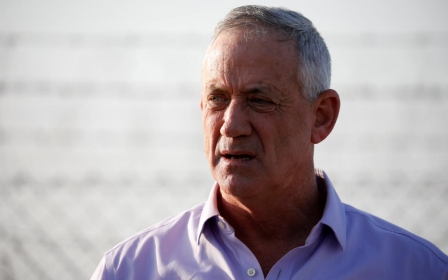'I am fed up': Longtime Likudniks say they've had enough of Netanyahu

Six weeks after Israeli Prime Minister Benjamin Netanyahu failed to form a coalition and rerun elections were called, his right-wing Likud party has remained unified – at least outwardly.
But among longtime Likudniks, there is a growing sense that that man who has repeatedly led their party to victory is now their greatest liability.
'I think that everyone understands that Netanyahu is on the way out or down'
- Keren Cactus Schwartz, member of New Likud
After years of swirling rumour, Netanyahu, who is also the chairman of Likud, now faces possible indictment for bribery, fraud and breach of trust in the months ahead.
As a result, some say they will look for a new party to support in September’s elections. Others say they have already left.
“I feel that a big part of the Likud – meaning Likud voters, party functionaries and Knesset members – are waiting for Netanyahu’s tenure to end,” said Keren Cactus Schwartz, an economist who belongs to "New Likudniks", who were formed out of the 2011 street protests against rising living costs, and want to limit state interference in people's lives and increase democracy in the party.
New MEE newsletter: Jerusalem Dispatch
Sign up to get the latest insights and analysis on Israel-Palestine, alongside Turkey Unpacked and other MEE newsletters
“I think that everyone understands that Netanyahu is on the way out or down. And the question is who is he going to take down with him.”
Meanwhile, party loyalists acknowledge that Netanyahu may be problematic, but there is no one better, they say, to lead the party.
“Bibi is the best that the Likud voters have as a camp by a wide margin,” said Eliran Gafso, a Likud member and chairman of the Betar movement, the Zionist movement started in 1923, who volunteers at the party's headquarters in Tel Aviv.
“As a movement, most people are with him. There are other voices too, but there’s a way to do things. You can express criticism, but properly. It’s true that power corrupts, but I think that Bibi did a very good job the last time around.”
Decades of dominance
Established in 1973, the right-wing Likud party has been a dominant force on the Israeli political scene since its victory in the 1977 elections, marking the first time the left had lost.
For decades since, the party has alternated with left-wing coalitions to lead the country, often forming coalitions with ultra-religious parties.
After a three-year stint as prime minister from 1996 to 1999, a Netanyahu-led Likud has been at the helm of country since 2009, drawing support, in part, from Mizrahi Jews (with Middle Eastern origins) who were discriminated against by Labor in the past and found a home in Likud.
But the attention around Netanyahu’s corruption charges has now tipped the balance for many of his one-time loyalists.
Schwartz, the economist with the New Likudniks, said: “Bibi is capable and has achieved a lot as prime minister. But that’s in the past. Today, Bibi is simply doing anything he can to stay in office.
“It’s embarrassing, like some grandfather who insists that he can climb the stairs on his own and instead he falls and breaks a vase or something.”
Others in the party think the corruption charges have been overplayed.
Didi Shor, 32, a member of the libertarian "Liberals in the Likud" faction and a journalist, said those on her wing of the party think the charges are an “invented pretext” used to bring Netanyahu down.
“We don’t think it’s a criminal matter. It’s a witch hunt,” she said.
Still, she said, Netanyahu is a disappointment for her. He’s talked a lot about annexation of the West Bank, but has yet to act on his promises.
Yet no member of the party, other than Netanyahu, will be able to deliver the next government, she said, so party members should rally around him – even if it’s not ideal.
“People say, as long as Bibi is alive, we will be the biggest party, the ruling party, we’ll run the country. The personal and collective interests of the individual Knesset members prevail. It makes me mad, but that’s the reality,” she said.
Gafso, the Likud member working at the party’s headquarters, also agrees that there’s no hurry to denounce Netanyahu as unfit to head the party or be prime minister.
“Unless there is some kind of ‘dangerous offence,’ we should follow French law on the presumption of innocence, and put the suspicions aside and let him continue in office,” he said.
But, he added, a prime minister should have term limits. “My biggest criticism is that they’re not nurturing the [next] right leader,” he said.
'I've stopped believing'
There are other veteran Likudniks who say they have recently left the party over Netanyahu’s political and economic policies, not the corruption charges trailing him.
'Domestically, all his legal entanglements…We don’t know anything for sure yet – but still, I am fed up'
- Ruti Levy, nurse and former Likudnik
Ruti Levy, 68, a nurse who lives in Petakh Tikvah in central Israel, had voted for Likud her entire life. But in the April election, disappointed with the party’s social welfare policies, she threw her support behind the newly formed Gesher party.
“At work, I see elderly and unfortunate people and I think, how can things be like this? And it applies to me, too. My pension is only 500 shekels ($139) a month and I have to keep working even though I’m retired,” Levy said.
“I think Netanyahu is doing just fine in terms of international relations, and I support his diplomacy. But domestically, all his legal entanglements… We don’t know anything for sure yet – but still, I am fed up.”
Levy also said she wants someone who is younger and has a vision for Israel.
“You can feel the undercurrents among the voters. It makes me cringe a little - the way he deals with the situation in the south [in communities near Gaza], and social welfare issues… I’ve stopped believing,” she said.
Yishai Moskowitz, a 38-year-old LGBTQ+ activist who lives in Rehovot and works in the high-tech industry, was a Likud member for years, but has joined the Zehut party, established by former Likud politician Moshe Feiglin, in April.
He said he didn’t like Likud’s “ugly politics”. Instead of letting members decide who should be on the party list, for example, he said it was powerful stakeholders calling the shots, particularly Netanyahu, whom he said had extensive influence over who was chosen.
“There are large groups handing out lists of their recommended candidates, and the party faithful gets tons of these messages on the eve of the primary – telling them not to believe anyone else, this is our list and you should vote for them.
“A lot of older people have gone along with this in the Likud for decades and they simply vote the way they’re told to. I don’t know if that’s the way it is today, but that’s what made me stop voting Likud.”
Middle East Eye delivers independent and unrivalled coverage and analysis of the Middle East, North Africa and beyond. To learn more about republishing this content and the associated fees, please fill out this form. More about MEE can be found here.






